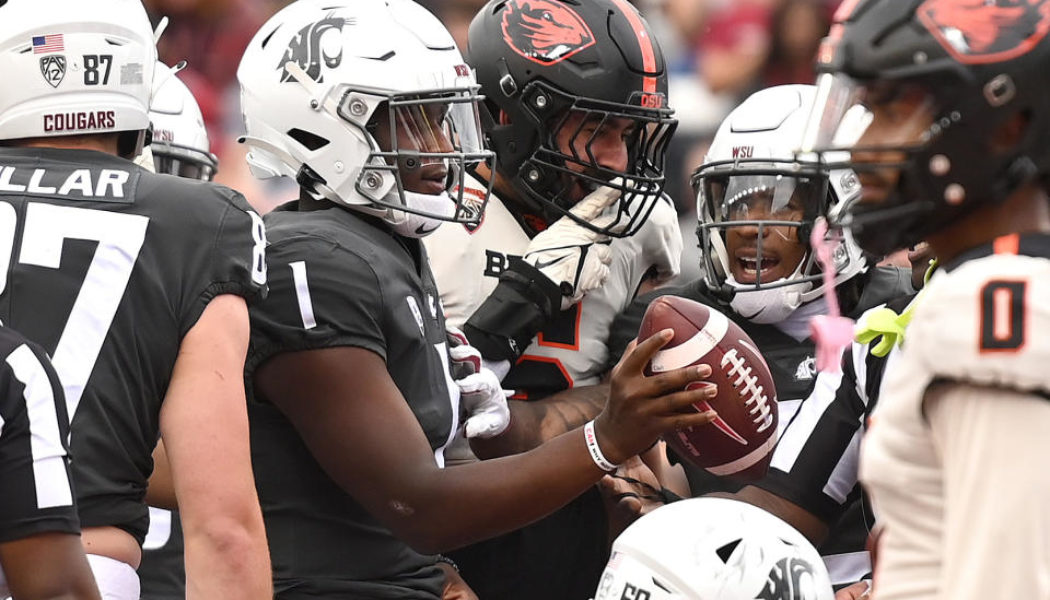
Oregon State, Washington State and the Mountain West are in the final stages of striking a football scheduling agreement for the 2024 season that includes a lucrative financial package for MWC schools, sources tell Yahoo Sports.
The remaining two members of the Pac-12 and the Mountain West are finalizing the long-talked about partnership with an announcement planned in the coming days. The agreement, for now just one season, is expected to include a fee of about $14 million paid to the Mountain West.
The alliance is built around what’s termed a “7+1” format where Mountain West teams play seven conference games — not eight — plus one game against either Washington State or Oregon State. There is an option to extend the deal to the 2025 season as well.
The two Pac-12 members will not be eligible for the MWC championship and will compete as quasi-independents under the Pac-12 banner. Those Mountain West schools with previously scheduled non-conference games against one of the two schools will play the other as well during the same season.
While there is not expected to be a contractual requirement for a long-term merger between the two entities, there is an intent and understanding of full-time membership for OSU and WSU in the Mountain West or a merger.
As for broadcasting rights, Mountain West home games against OSU and WSU will be televised in regular fashion by MWC TV partners Fox and CBS Sports Network. The league will keep the additional media rights revenue from those games to be distributed across the conference.
Oregon State and Washington State are likely to negotiate separate broadcasting agreements with those networks and potentially others to televise their own home games. The Pac-12’s TV deal with ESPN and Fox ends after this academic year.
For now, the scheduling alliance is football only. The two entities continue to explore a similar scheduling agreement for men’s and women’s basketball, though an agreement is likely weeks away. Oregon State and Washington State are in discussions with other leagues to create affiliate memberships for their other sports.
The football scheduling alliance solidifies the immediate future for the Beavers and Cougars at a precarious time. The transfer portal in football opens Monday. Oregon State already lost its coach, Jonathan Smith, who left for Michigan State.
The programs were left homeless after 10 of their Pac-12 mates left for three other leagues in one of the more jarring conference realignment shifts in college sports history. The schools stand to lose at least $25 million annually in Pac-12 and Power Five conference distribution, though they are likely due a windfall of league revenue over the next two years.
Administrators from both schools have said publicly that they will continue to financially support their athletic programs at a Power Five level, using state and school funds as well as those Pac-12 assets.
They plan to remain as a two-school league for at least a year and maybe two as a way to keep alive the Pac-12 brand and its resources. The schools landed a victory earlier this month when a Washington county court granted a preliminary injunction that gives them control of more than $400 million in assets this year and, likely, more than $100 million in additional assets through 2025.
However, the ruling, for now, is delayed while the exiting Pac-12 schools are filing an appeal.
The decision is a strong sign that the Cougars and Beavers may soon have access to millions of dollars in Pac-12 revenue from television contracts, the Rose Bowl and NCAA basketball tournament units. That revenue is normally distributed to each school starting with installments in December. Each school is due about $35-40 million.
The cash could help the two schools pave their future, including arranging such a deal with the Mountain West and paying off Pac-12 liabilities. The conference is a defendant in multiple legal challenges.
The two entities — the Pac-2 and Mountain West — have been sporadically engaged in discussions over their futures together for the last several weeks. That includes Mountain West schools merging with the two to compete under the Pac-12 brand — a way to preserve the league. Though outlandish and unlikely, a relegation model has been discussed among some administrators as well.
This embedded content is not available in your region.
The schools are using a two-year NCAA grace period to remain a two-team league. Conferences falling below the minimum eight members are allowed two years to return to the eight-member mark before they are no longer recognized as a conference.
In the short term, Oregon State and Washington State need to complete their 2024 and potentially 2025 football schedules. An arrangement with the Mountain West provides them with six opponents each year: three home and three away. The two programs already have scheduled three non-conference games — some against MWC teams — and will pick up other games, including continuing their in-state rivalry series with Washington and Oregon. Washington State-Washington has announced the continuation of their series. Oregon and Oregon State have not, though it is eventually expected.
The shakeup in the Pac-12 has triggered changes in the sport’s postseason.
At their meeting earlier this month, FBS commissioners recommended a change to the expanded College Football Playoff format, agreeing on a model that grants automatic qualifiers to the highest-ranked five conference champions and at-large spots to the next highest-ranked teams — a move from a 6+6 model to a 5+7. The change must be approved by unanimous consent by the commissioners’ corresponding board of presidents.
Commissioners also established a policy requiring a conference to have eight members for its champion to be eligible for an automatic qualifying spot. That policy does not need presidential approval, CFP director Bill Hancock told Yahoo Sports.
Such a policy change eliminates Oregon State and Washington State from an automatic bid into the playoffs for winning a Pac-2 league. They would only be eligible for an at-large berth.
Services Marketplace – Listings, Bookings & Reviews









